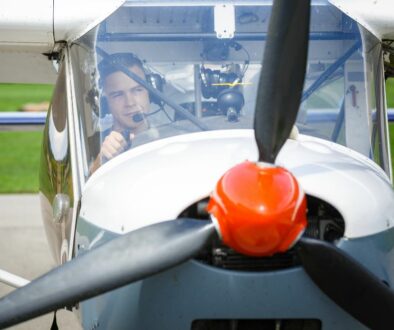How To Become A Fighter Pilot?
Becoming a fighter pilot is a dream that many young people have, but few know how to make it a reality. This prestigious career is challenging, exciting, and rewarding, attracting only the most talented and dedicated individuals. If you’re wondering how to become a fighter pilot, here are the steps you need to take, the skills you need to develop, and what you can expect from this career.
Steps To Becoming A Fighter Pilot
Following these steps will help you in your pursuit of becoming a Fighter Pilot:
- Join the Air Force
The first step to becoming a fighter pilot is to join the military, specifically the Air Force. You will need to meet the Air Force’s qualifications, which include being a U.S. citizen, having a high school diploma or equivalent, being in good physical shape, and passing the Air Force Officer Qualifying Test (AFOQT). This test is designed to measure your ability to handle the stresses of being a fighter pilot, including your mental and physical agility, administrative skills, communication ability, and leadership qualities.
Joining the Air Force as a fighter pilot is a highly competitive field. You will need to be in excellent physical shape and have a strong academic record to be considered. The Air Force is looking for individuals who are self-motivated, disciplined, and have a strong desire to serve their country. - Complete a Bachelor’s Degree
Once you have passed the AFOQT, you will need to complete a Bachelor’s degree in any field. While there is no specific major required to become a fighter pilot, taking courses in science, technology, engineering, and mathematics (STEM) can give you an edge in the highly technical and challenging field of aviation. You can attend any college that has an Air Force ROTC (Reserve Officer Training Corps) program or attend the United States Air Force Academy.
Attending the United States Air Force Academy is a highly prestigious and competitive option for those looking to become fighter pilots. The Academy provides a rigorous academic program, as well as extensive physical and military training. Graduates of the Academy are highly sought after by the Air Force and are often given priority in the selection process for fighter pilot training. - Attend Officer Training School (OTS)
After completing your degree, you will attend Officer Training School (OTS) at Maxwell Air Force Base in Montgomery, Alabama. There, you will receive hands-on training in leadership, communication, and military tactics, as well as physical training and combat simulations. You will learn how to lead and manage a team, as well as how to make quick and effective decisions under pressure.
During your time at OTS, you will also have the opportunity to network with other aspiring fighter pilots and members of the Air Force. Building relationships and connections within the Air Force can be extremely beneficial in the long run, as it can lead to more opportunities and career advancement. - Attend Specialized Undergraduate Pilot Training (SUPT)
After completing OTS, you will attend Specialized Undergraduate Pilot Training (SUPT), which consists of academic, flight simulator, and in-flight training. You will learn the basics of flight, navigation, and aerodynamics, including basic maneuvering, takeoff, and landing, as well as emergency procedures.
During SUPT, you will be evaluated on your performance and progress. Those who excel in the program may be selected for advanced training in specific aircraft, such as the F-16 Fighting Falcon or the F-22 Raptor. - Attend Fighter Fundamentals Course
After SUPT, you will attend a Fighter Fundamentals Course, where you will learn the specific skills and tactics involved in flying and fighting in a fighter jet. You will learn how to operate the advanced technology and weaponry of a fighter jet, as well as how to engage in air-to-air combat.
- Attend Formal Fighter Pilot Training Program
Finally, you will attend a formal fighter pilot training program that will prepare you for your role as a fighter pilot in the Air Force. This training will be intensive and challenging, as you will be required to demonstrate your skills and knowledge in a variety of scenarios and situations.
Becoming a fighter pilot in the Air Force is a challenging and rewarding career path. It requires dedication, hard work, and a strong desire to serve your country. If you are up for the challenge, the Air Force offers a variety of opportunities and resources to help you achieve your goals.
Skills Needed For Becoming A Fighter Pilot
Besides passing the necessary qualifications and completing the training, there are several skills you will need to develop to become a successful fighter pilot. These include:
- Excellent Physical Shape: Fighter pilots need to be physically fit to handle the stresses of flying high-speed fighter jets. They need to have good cardiovascular endurance, excellent hand-eye coordination, and quick reflexes.
- Mental Agility: Fighter pilots must make split-second decisions in high-pressure situations, so they must be mentally alert, able to handle stress, and able to think critically.
- Leadership Abilities: Fighter pilots are part of a team, and they need to be able to lead, communicate, and work effectively with others.
- Excellent Communication Skills: Fighter pilots need to be able to communicate effectively with their team and ground control while flying at high speeds and under extreme pressure.
- Attention to Detail: Fighter pilots must be able to pay close attention to details, including the mechanical systems of their aircraft, weather patterns, and tactics used by enemy forces.
Physical fitness is a crucial aspect of becoming a fighter pilot. The physical demands of flying a high-speed fighter jet are immense, and it requires pilots to be in excellent shape. Cardiovascular endurance is essential as fighter pilots must withstand high G-forces, which can cause blackouts or even unconsciousness. Pilots must be able to handle these forces while maintaining control of their aircraft.
Hand-eye coordination is another critical skill for fighter pilots. They need to be able to react quickly to changing situations, and their reflexes must be sharp. Pilots must be able to track multiple targets at once and make quick decisions about which target to engage.
Mental agility is also essential for fighter pilots. They must be able to make split-second decisions in high-pressure situations. Pilots must be able to stay calm and focused, even when facing dangerous situations. They must be able to analyze situations quickly and make decisions that could mean the difference between life and death.
Leadership abilities are also important for fighter pilots. As part of a team, pilots must be able to lead, communicate, and work effectively with others. They must be able to coordinate with their wingmen and communicate effectively with ground control.
Excellent communication skills are necessary for fighter pilots. They must be able to communicate effectively with their team and ground control while flying at high speeds and under extreme pressure. Pilots must be able to relay information quickly and accurately, even in the midst of a high-pressure situation.
Attention to detail is critical for fighter pilots. They must be able to pay close attention to details, including the mechanical systems of their aircraft, weather patterns, and tactics used by enemy forces. Pilots must be able to anticipate potential problems and take action to prevent them from occurring.
What is A Fighter Pilot?
A fighter pilot is not just a skilled military aviator, but also a symbol of bravery, courage, and patriotism. They are the elite of the elite, trained to fly high-performance jet fighter aircraft, engage in aerial combat, and carry out complex and dangerous missions in support of national security interests.
Being a fighter pilot is not just a job, it’s a way of life. It requires a unique set of skills, physical fitness, and mental toughness. Fighter pilots work in a high-pressure environment, where they must be able to operate their aircraft with precision and accuracy, make rapid decisions, and respond to threats quickly and effectively.
But being a fighter pilot is not just about flying fast planes and shooting down enemies. It’s also about being a leader, a team player, and a problem solver. Fighter pilots must be able to work effectively as part of a team, communicating with other pilots and ground personnel to coordinate their actions and execute their missions successfully. They must be able to think on their feet, adapt to changing situations, and make split-second decisions that could mean the difference between life and death.
Moreover, fighter pilots are not just warriors, but also ambassadors of their country. They represent the best of their nation, and their actions in the air can have far-reaching political and diplomatic consequences. They must always be aware of the impact of their actions, and strive to uphold the highest standards of professionalism and integrity.
Being a fighter pilot is one of the most challenging and rewarding careers available to young people today. It requires dedication, hard work, and sacrifice, but it also offers the opportunity to serve one’s country, to push oneself to the limits, and to be part of a proud and noble tradition of military aviation.
The Benefits of Working as A Fighter Pilot
Besides the thrill of flying high-performance jets and carrying out critical missions in defense of national security interests, there are several benefits to working as a fighter pilot. These include:
- Job Security: The military offers stable employment, with guaranteed pay, benefits, and retirement plans.
- Career Advancement: Fighter pilots can rise through the ranks to become officers and leaders within the military.
- A High Level of Training and Education: Fighter pilots receive extensive training and education, which can be applied to other careers outside of the military.
- Patriotic Duty: Fighter pilots serve their country and play a critical role in maintaining national security and defending the nation’s interests.
But there’s more to being a fighter pilot than just the benefits. The profession also offers a unique set of experiences and challenges that are unmatched in any other career.
One of the most exciting aspects of being a fighter pilot is the opportunity to fly some of the most advanced aircraft in the world. These planes are designed to push the limits of what’s possible, with cutting-edge technology and capabilities that are constantly evolving.
But flying a fighter jet isn’t just about the thrill of speed and maneuverability. It also requires a high level of skill and precision, as well as the ability to make split-second decisions in high-pressure situations.
As a fighter pilot, you’ll also have the opportunity to work with some of the most talented and dedicated individuals in the military. You’ll be part of a team that is committed to excellence and driven to succeed, no matter what challenges may arise.
And while the job can be demanding and requires a significant amount of training and preparation, the rewards are well worth the effort. Whether you’re flying a mission over enemy territory or providing support to troops on the ground, you’ll be making a real difference in the world and contributing to the safety and security of your country.
So if you’re looking for a career that offers excitement, challenge, and the opportunity to serve your country, consider becoming a fighter pilot. With the right skills, dedication, and training, you can be part of an elite group of professionals who are making a difference every day.




